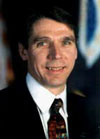We hear that when U.S. Forest Service Chief Mike Dombeck issued (or at least appeared to issue) a new policy last week barring the cutting of old-growth timber on national forest lands he did not exactly have the green light from President Clinton.

We like Mike.
In fact, according to our sources, the president-for-the-next-few-days and his senior staff hit the roof when news of Dombeck’s order accompanied with remarks by the chief rocketed to the top of New York Times earlier this month. The paper of record described the new policy as a direct slap at the incoming George W. Bush administration and as potentially more important than Clinton’s recent ban on road-building on 58.5 million acres of forestland.
“The boss does not like to be upstaged,” said one observer familiar with White House reaction to the Times story. “By Tuesday afternoon,” according to this source, some people in the White House were so angry “they had trouble sitting down.”
This source and several others said it wasn’t so much what Dombeck said at Duke University (read the speech here) as the way the Times played it that got the White House dander up.
Dombeck aide Chris Wood said the speech had been “overreported on” and that in reality it amounted to little more than a restatement of principles Dombeck has long advocated: getting an accurate map of old-growth timber and doing everything possible to limit old-growth logging.
This, of course, could be cover-your-backside spin in the wake of a tongue-lashing from the White House, but Wood said that Dombeck was simply “telegraphing” his belief that in the coming months the Forest Service should in fact develop “manual directions” to send to national forest managers instructing them not to allow sales of old-growth timber.
“What Dombeck said was that in the coming year one priority will be to revisit and strengthen the existing 1989 old-growth statement,” Wood said. “He didn’t go out and ban old-growth timber cutting. Folks would do well to read the entire speech and take it for what it says.”
The Bush transition team will undoubtedly do so. By law Dombeck is entitled to stay in his post for the first 120 days of the new administration (theoretically enough time to get an old-growth harvesting ban into the Forest Service manual) and he has said he would like to continue to stay on after that. Don’t count on it. In fact, one source said that after the New York Times story, Dombeck might not even last till the end of the current administration.
Hen in the Fox House?
Speaking of the incoming Bush forces, conservative groups are less than thrilled with John F. Turner’s presence on the Interior Department transition team. Seems that Turner, who ran the U.S. Fish and Wildlife Service under former President George Bush, is far too sympathetic to environmental causes to suit the likes of the American Land Rights Association, which contends that because Turner is a “lifetime close personal friend” of Vice President-elect Dick Cheney, he will be able to “cut [ Interior Secretary-designate] Gale Norton off at the knees.”
Not only that but Turner, president of the Conservation Fund, might even be able to “reverse some of her directives.” That’s a lot of power for a man who hasn’t been named to anything yet.
Perhaps the private property lobby has reason for concern. Call around town these days and ask enviros whom they expect to see in the new Interior Department and Turner’s name often comes up as someone who might temper what many green groups fear will be the new Bush administration’s zeal to drill, log, build on, and otherwise make extractive use of America’s public lands.
“He would be relatively good in a relatively indifferent administration,” said Sierra Club Political Director Dan Weiss in an endorsement not likely to further endear Turner to conservatives.
Brave New World
So how exactly are environmental groups expecting to operate in the new Washington environment, where they won’t have many allies installed in the executive branch?

Norton faces a gale of opposition.
During the campaign, Ralph Nader spoke of the galvanizing effect a Bush administration might have on progressive groups. That’s certainly been the case so far, particularly with the rapid and well-organized opposition to Gale Norton’s nomination for Interior.
In fact, in several conversations with green group flacks and leaders, Muckraker found that opposing Norton (and to a lesser extent John Ashcroft as attorney general) was the first order of business. Research on Norton’s record and statements (such as her speech praising the states’ rights cause of the Confederacy) has kept plenty of industrious staffers busy and many reporters’ email inboxes full.
“The first battle is really over Norton’s nomination,” said the Sierra Club’s Weiss. “How well we do is going to affect what we do afterward. The second battle will be over campaign finance reform.”
Weiss and many other enviros see a ban on soft money contributions as a potentially devastating blow to the outsized influence powerful (and often polluting) corporations have on the political process. But with the majority leader of the Senate (not to mention a certain Sen. Mitch McConnell from Kentucky) along with the President-elect strongly opposed to any reform that does not also limit union political spending, the future of the McCain-Feingold bill remains very uncertain.
Also on the incoming administration front, Laura Chapin at the Environmental Working Group is spending a good deal of time publicizing the backgrounds of Bush transition team members. Her group just updated its website with annotated pages featuring names and corporate-lobbying and interest-group affiliations of the transition teams at Agriculture, Energy, Interior, and EPA.
What the EWG site doesn’t mention, but what many other enviros waste little time pointing out, is that no less a player than incoming White House Chief of Staff Andy Card (far more powerful than any Cabinet secretary) was until recently a $600,000 per-year lobbyist for the American Automobile Manufacturers Association, helping the auto industry fight off pesky new fuel-efficiency standards, among other things.

Tankers away!
The site also doesn’t mention that incoming National Security Adviser Condoleezza Rice once sat on the board of Chevron and was so favored by the company that she had an oil tanker named after her.
But we digress. Returning to the future plans of D.C. green groups, Dave King and Brandon MacGillis of the National Environmental Trust say their group, in addition to working to distribute material on Norton and other Cabinet nominees, will adjust its focus outside the Beltway over the next couple years, working directly with (and presumably in some cases against) corporations on environmental issues such as biotech food production.

